Advisory services offered through Reyes Financial Architecture, Inc, an SEC-Registered Investment Advisory Firm. Reyes Financial Architecture, Inc. does not offer tax or legal advice. The opinions voiced in this material are for general information only and are not intended to provide specific advice or recommendations for any individual. Past performance is not a guarantee of future results. To determine which investments may be appropriate for you, consult with your financial advisor.
As we have learned time and again, the financial market demonstrates extreme unpredictability; such volatility underscores the necessity of safeguarding your retirement savings against potential losses. Avoiding significant financial setbacks is particularly crucial for those in or nearing retirement.

Major market downturns can severely jeopardize retirement plans. History is a testament to this, with the 2000s witnessing two 50% losses and the COVID crash marking a downturn of 35%. For someone with a retirement fund of a million dollars, a 50% loss means half of their savings could evaporate rapidly.
Such a scenario has dire consequences since it directly threatens retirement income, which many rely on for their day-to-day expenditures during their golden years.
For individuals in the 'Retirement Red Zone,' which refers to those who are close to retiring, the priority should be capital protection. This doesn't negate the need for growth, but emphasizes the importance of securing the assets you have accumulated before seeking further growth. By focusing on asset preservation and maximizing cash flow, retirees can enjoy more peace of mind.
Effective tax planning stands as a powerful tool in the arsenal for protecting retirement savings. By reducing tax liabilities, you're essentially reducing expenses, which translates to increased income and, ultimately, greater financial security.
For those who have diligently saved for retirement, expert assistance in crafting a personalized financial plan is invaluable. By taking advantage of a complimentary retirement blueprint, you can gain insights into where your finances currently stand and explore the optimal steps towards a secure retirement.
The guidance provided in these sessions can be instrumental in guiding you through the best ways to prepare for a retirement that's both financially fruitful and invulnerable to the unpredictabilities of the market.
To harness the benefits of such expertise, the first step is to reach out and request a consultation. With a robust retirement blueprint, you'll have the roadmap needed to navigate towards a successful retirement, ensuring your savings are not only protected but primed for sustainable growth.
The road to retirement may be fraught with economic uncertainties, but with vigilant planning and strategic financial decisions, you can cushion your savings from market turmoil and chart a course for a fulfilling retirement. If you're keen to protect and grow your money, consider reaching out to plan your retirement blueprint and take control of your financial destiny.
Check out David on 10 News (KGTV-TV) discussing ways the pandemic gives opportunities to retirement investors.
The COVID-19 pandemic sent shockwaves through the global economy, severely impacting the stock market and leaving many Americans anxious about their financial futures. As the pandemic unfolded, 10 News Morning made it a priority to provide original reporting and solutions to address the concerns of viewers. In this article, we explore how individuals like Steve Murphy turned adversity into an opportunity for financial growth by capitalizing on expert advice.
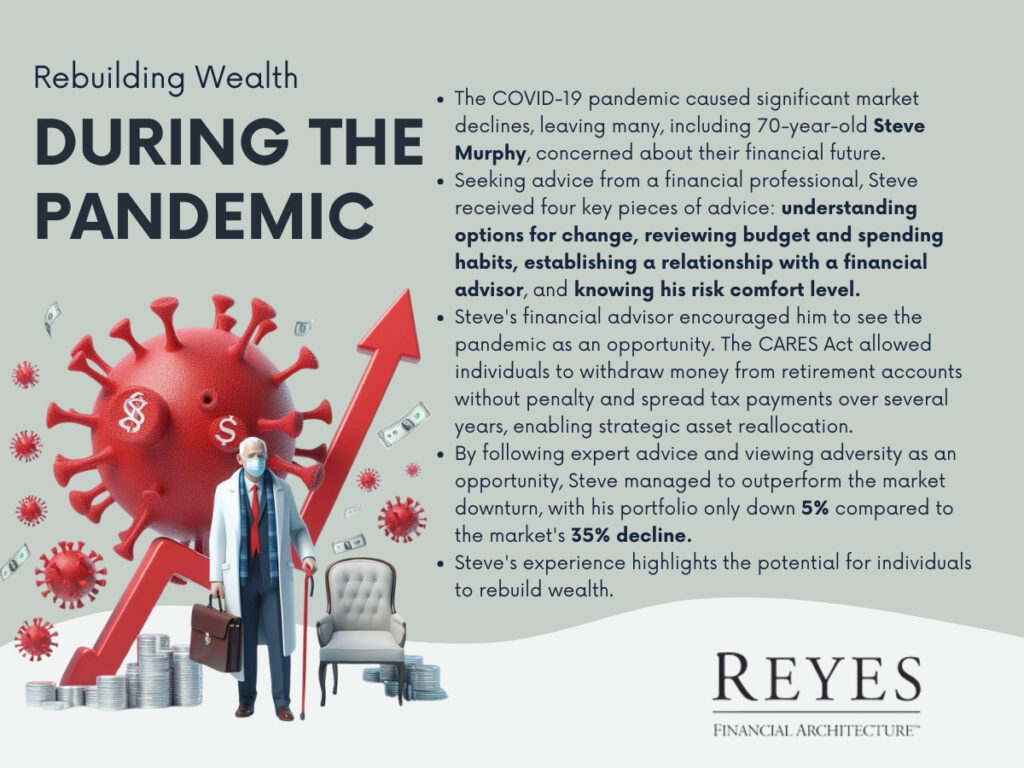
At the onset of the pandemic, the stock market experienced significant declines, causing unease among investors of all ages. Steve Murphy, a 70-year-old who had planned to retire in the summer, was among those deeply concerned by the market's tumultuous journey through February and March. He admits to being a natural worrier and recounted numerous sleepless nights during this period.
However, Steve decided to seek advice from a financial professional, who provided four key pieces of advice that anyone could follow:
The financial professional also encouraged Steve to view the pandemic as an opportunity. They pointed out that the federal CARES Act offered a unique provision: allowing individuals to withdraw money from their retirement accounts without penalty, either as a loan or distribution, and spread the tax payments over several years. This was a significant development that allowed individuals to strategically move their investments from high-risk to low-risk assets.
Rather than panic-selling when the market was down, the financial expert saw this as a prudent form of money management. By embracing the opportunity to reallocate assets, investors could position themselves to take advantage of market rebounds and ultimately achieve better long-term performance.
For Steve Murphy, following the advice of the financial professional proved to be a game-changer. While the markets had dropped by approximately 35%, Steve's portfolio was only down by 5%. Even more encouragingly, his investments started to outperform their previous year's performance.
Steve's success story illustrates the potential for individuals to rebuild their wealth during challenging times by making informed decisions and viewing adversity as an opportunity. The pandemic serves as a valuable reminder for investors to focus on long-term financial goals when making investment decisions.
The COVID-19 pandemic brought unprecedented challenges to the financial world, leaving many individuals anxious about their retirement plans. However, as seen through Steve Murphy's experience, strategic advice from financial experts and a willingness to see crisis as an opportunity can lead to financial resilience and long-term growth. As we navigate an ever-changing economic landscape, the lessons learned from the pandemic can serve as valuable tools for securing our financial futures.
Check out David on CBS8 (KFMB-TV) discussing ways to reduce expenses amid the coronavirus pandemic.
The ongoing COVID-19 pandemic has forced all of us to adapt to a new way of life, which has, in turn, presented financial challenges for many individuals and families. News 8 recently interviewed a local financial expert to shed light on strategies for navigating these uncertain times by focusing on reducing expenses. In this article, we explore practical ways to trim spending and secure your financial stability amid the pandemic.

The coronavirus pandemic has reshaped our daily routines, and with it, our spending habits have also evolved. Social distancing measures and stay-at-home orders have led us to reevaluate what we prioritize in our lives. According to the local financial expert, this shift in our routines provides a unique opportunity to reassess our finances.
By staying at home more often, many people have naturally reduced certain expenses. Dining out, entertainment expenses, and even commuting costs have all seen a decrease. Additionally, the expert points out that gas prices have significantly dropped, offering further relief to household budgets.
The COVID-19 pandemic has undoubtedly introduced financial uncertainty into our lives, but it has also prompted us to reevaluate our spending habits. By making strategic choices and embracing frugality, individuals and families can reduce expenses and strengthen their financial stability during these challenging times.
Remember that the adjustments you make now, whether big or small, can have a meaningful impact on your immediate financial situation and provide a foundation for future financial resilience. By taking proactive steps to manage your finances and cut unnecessary costs, you can navigate the pandemic with greater confidence and security.
Check out David on KOB 4 (KOB-TV) discussing the stock market amid the coronavirus pandemic.
The stock market has been on a wild ride during the coronavirus pandemic, leaving investors anxious about their retirement funds. In this article, we will explore the recent market turbulence and offer advice from financial experts on how to navigate these uncertain times.
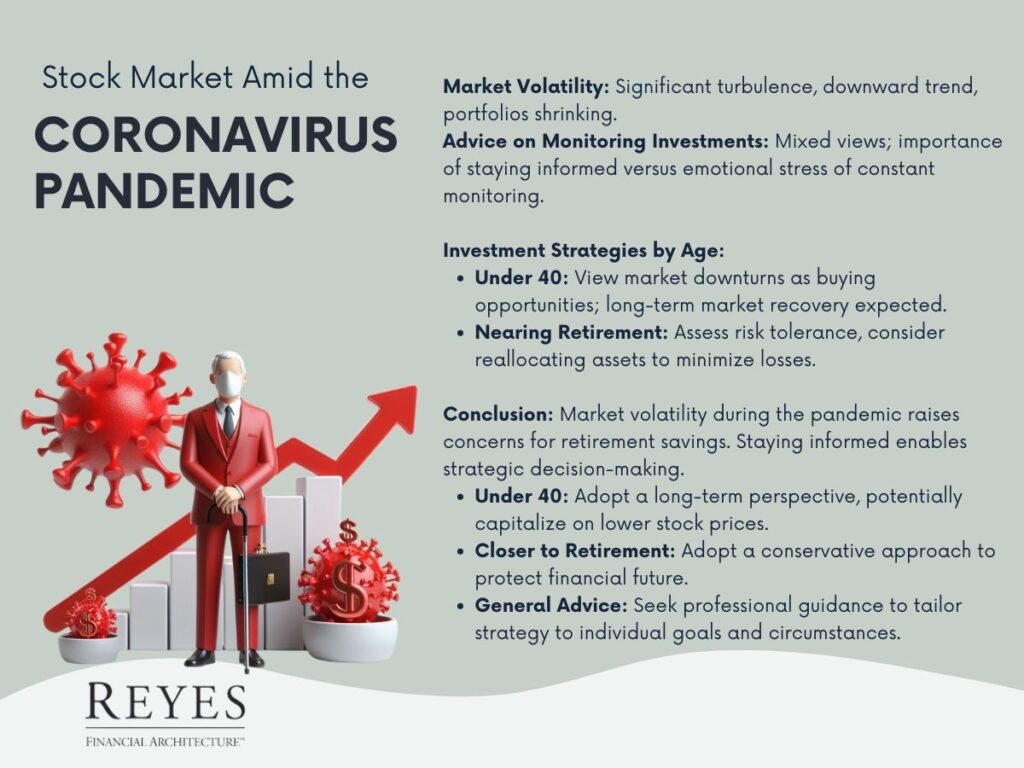
In recent weeks, the stock market has experienced significant turbulence. Despite some brief rallies, the overall trend has been downward, leaving the market below its levels from just a month ago. Investors have watched their portfolios shrink rapidly, prompting concerns about their long-term financial well-being.
Advisors have been speaking with individuals who have seen their investments decline by substantial percentages in a matter of weeks. Such abrupt losses can be emotionally challenging for investors, making it crucial to make informed decisions in this climate of uncertainty.
One prevailing piece of advice is to resist the temptation to constantly monitor your investment accounts during periods of market instability. However, some experts suggest a different approach. While it can be disheartening to witness daily declines, staying informed about your financial situation is essential.
Regularly checking your accounts can provide you with a clearer understanding of where you stand financially. It enables you to make educated decisions regarding your investment strategy and potential adjustments needed to align with your financial goals.
Experts recommend different strategies based on your age and financial circumstances. For individuals under the age of 40, panic may not be warranted. Historical market data shows that markets tend to recover from downturns, and the current situation may present an opportunity. Lower stock prices can be viewed as a potential buying opportunity, provided you have the financial capacity to invest more.
Conversely, those closer to retirement may face more significant challenges. The last major bear market in 2007 lasted for 18 months and took years to recover fully. If you fall into this category, it's crucial to review your portfolio carefully. Assess your risk tolerance and consider reallocating your assets to minimize potential losses in the event of another downturn.
The stock market's volatility during the coronavirus pandemic has left many investors concerned about their retirement savings. While it might be tempting to avoid checking your investment accounts during turbulent times, staying informed is vital.
Financial experts recommend that individuals under 40 approach the situation with a long-term perspective, viewing the current market as an opportunity. For those closer to retirement, a more conservative approach may be necessary to protect their financial future.
Regardless of your age, it's advisable to seek professional guidance from a financial advisor to create a tailored strategy that aligns with your specific goals and circumstances.
Check out David on CBS8 (KFMB-TV) discussing the stock market plunge due to the coronavirus.
In recent days, the global stock markets have experienced a significant decline, largely attributed to the ongoing coronavirus pandemic. Market volatility has raised concerns about the economic impact and its implications for investors. In this article, we will discuss the latest developments on Wall Street and the potential repercussions on both personal finances and the broader economy.
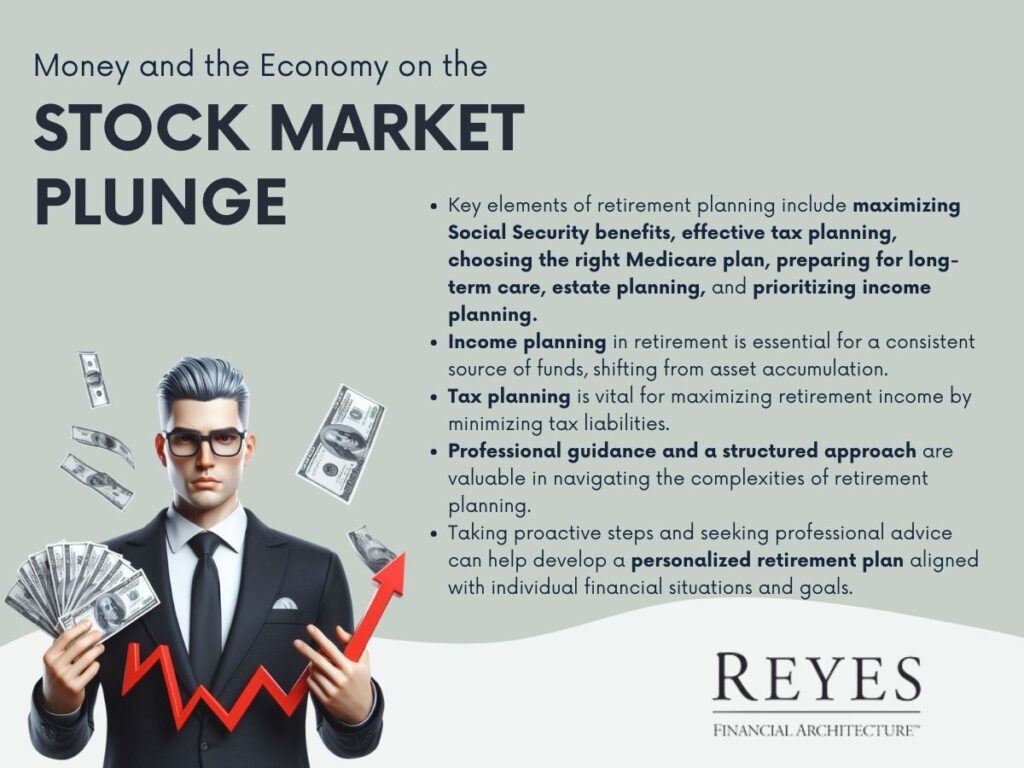
At present, the Dow Jones Industrial Average (Dow) has seen a sharp drop of 1,609 points. This marks the second consecutive day of market openings at alarmingly low levels, leading to temporary halts in trading. Such fluctuations have understandably caused apprehension among investors. However, understanding the underlying factors driving these market movements is essential.
Undoubtedly, the coronavirus outbreak has been a major catalyst for the recent market downturn. However, experts believe that the market was overdue for a correction, and the virus has acted as a trigger for this correction. What initially started as a health crisis has now evolved into a full-fledged financial crisis, underscoring the gravity of the situation.
One of the primary concerns among investors is the potential for an impending recession. It is worth noting that while the likelihood of a recession has increased, the situation is fluid. Factors such as the strength of the economy prior to the crisis can influence the depth and duration of any recession.
Amid the gloomy economic outlook, there are some potential silver linings to consider. Interest rates and mortgage rates have reached historic lows, presenting opportunities for those interested in refinancing or purchasing a home. Additionally, the plummeting oil prices have resulted in lower gas prices, potentially offering some relief to consumers.
For investors wondering how to safeguard their investments during this volatile period, experts recommend staying patient and waiting for potential market rebounds before reevaluating and realigning their portfolios. Risk management is crucial, but those who have not already implemented such strategies may find it challenging to do so at this point.
Regarding the possibility of a market rebound, experts remain cautiously optimistic. Various stimulus measures, including interest rate cuts and discussions about payroll tax reductions, are being implemented. However, these measures typically take time to yield results, and a significant recovery may take several months.
Experts advise against making impulsive investments in the current market climate. Patience is crucial, as there may still be further market declines in the short term. Instead, it is advisable to use this time to have meaningful discussions with financial advisors and reevaluate investment strategies.
The recent stock market turbulence has raised concerns about personal finances and the overall economic landscape. While uncertainties persist, it is important for individuals to remain informed and make informed decisions regarding their investments.
History has shown that markets can recover, and with prudent strategies and expert guidance, it is possible to navigate through these challenging times and emerge stronger in the end.
Check out David on CBS8 (KFMB-TV) discussing the stock market volatility due to the coronavirus.
The recent turmoil in the US financial markets, primarily driven by fears surrounding the coronavirus, serves as a stark reminder of how global health concerns can have far-reaching impacts on economic stability. On a day marked by considerable anxiety, the major US stock indexes plummeted nearly 8 percent, indicating a growing sense of unease among investors.
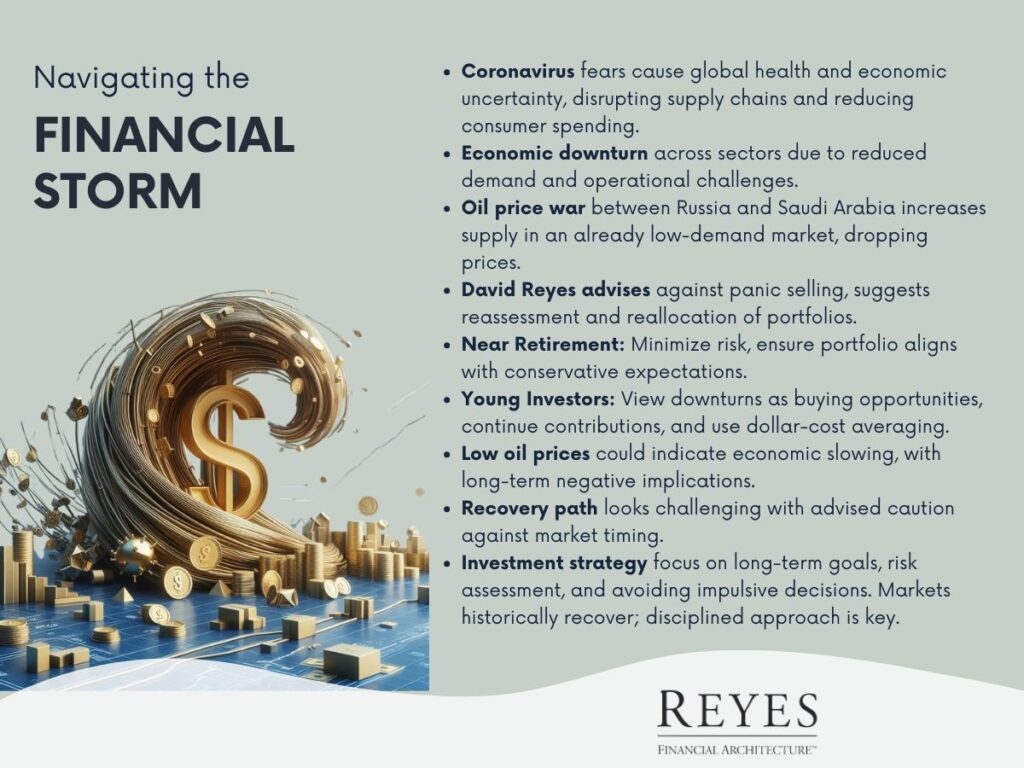
Several factors converged to drive this significant sell-off in the stock market. Among the primary concerns were:
David Reyes, a registered investment advisor with over two decades of experience, emphasizes the need for investors to stay calm and reassess their investment strategies. He advises against panic selling, noting that such downturns, though severe, are also opportunities for portfolio reevaluation and reallocation.
While the decline in oil prices might lead to lower gas prices, benefiting consumers, it also signals a reduction in economic activity. Prolonged low oil prices can be indicative of a slowing economy, which could have long-term negative implications.
The path to recovery for the stock market appears challenging. With the convergence of multiple negative factors, a swift rebound seems unlikely. Investors are cautioned to stay vigilant and avoid trying to time the market bottom, as such attempts often lead to further losses.
In times of market turbulence, the importance of a well-considered investment strategy becomes paramount. Investors should focus on long-term goals, assess their risk tolerance, and avoid making impulsive decisions based on short-term market movements. It’s crucial to remember that markets have historically recovered from downturns, and maintaining a disciplined approach can help navigate these challenging times effectively.
In conclusion, the current scenario in the US financial markets, heavily influenced by the coronavirus pandemic and other economic factors, calls for a balanced and informed approach to investing. By understanding the underlying causes of market volatility and adopting appropriate investment strategies, investors can better manage their portfolios in the face of uncertainty.
Check out David on KUSI-TV discussing immediate steps to take if you're retiring in 2020.
The persistent specter of coronavirus fears continues to cast a shadow over the US financial markets, leading to another sharp decline in stocks. Major stock indexes plummeted nearly 8 percent in a single day, causing widespread anxiety among investors.
In this article, we will delve into the factors responsible for the recent market crash, explore prudent steps for investors in these turbulent times, and discuss the prospects for a market recovery.
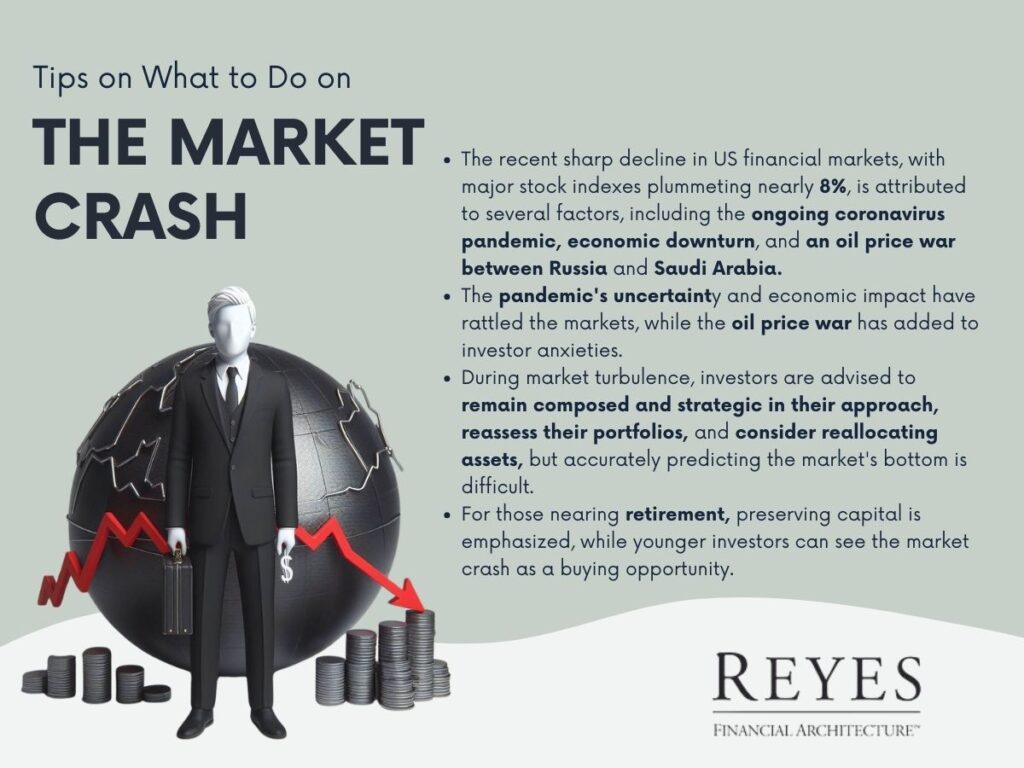
Several factors have converged to create the perfect storm that triggered the recent market sell-off. Foremost among these factors is the ongoing coronavirus pandemic, which has not only disrupted daily life but has also severely impacted the global economy. The uncertainty surrounding the virus's trajectory and its economic ramifications has sent shockwaves through the financial markets.
Adding to this precarious situation is the economic downturn resulting from the pandemic. As businesses closed their doors and unemployment rates soared, investors grew increasingly concerned about the long-term implications for corporate profits and economic stability.
Furthermore, an unexpected oil price war erupted between Russia and Saudi Arabia, exacerbating market anxieties. Both nations engaged in a battle of overproduction, flooding the market with oil and creating an oversupply situation that far exceeded demand. This drove oil prices downward, further destabilizing global markets.
In times of market turbulence like these, it is crucial for investors to remain composed and strategic in their approach. One piece of advice is to pause, take a breath, and reconsider your investment decisions.
It is an opportune moment for investors to reassess their portfolios and consider reallocating their assets. However, it is important to remember that accurately predicting the market's bottom is exceedingly difficult.
For those nearing retirement, a cautious approach is recommended, focusing on preserving capital rather than taking unnecessary risks. Ensuring that your investment strategy aligns with your current life stage and financial objectives is vital.
Conversely, young investors can view this market crash as an opportunity to buy. By continuing to contribute to their retirement accounts, they can leverage lower prices and employ dollar-cost averaging to mitigate the impact of market volatility.
Unfortunately, experts caution that the stock market is unlikely to rebound rapidly. In fact, it may experience further declines before displaying signs of recovery. Investors who are solely focused on recouping their losses may find themselves disappointed, given the uncertainty surrounding the market's bottom.
One potential positive aspect of this market turmoil is the expected reduction in gas prices due to the plummeting oil prices. Nonetheless, this decline signifies decreased economic activity in the long term, which is a cause for concern.
In light of the recent market crash, investors must remember that maintaining composure and making well-informed decisions are of paramount importance. Although the road to recovery may be uncertain, taking prudent measures to reevaluate and adjust your investment strategy can help navigate these challenging times.
By understanding where you stand in your financial journey and aligning your actions with your goals, you can weather the storm and position yourself for a more secure financial future.
Check out David on KUSI-TV discussing three financial strategies to consider for the New Year.
In the realm of financial planning and investment, a distinguishing factor among firms is the approach they take towards portfolio construction and risk management. This blog post delves into the intricacies of building a diverse and robust investment portfolio, moving beyond the traditional mix of stocks and bonds.
It draws on insights from a financial advisor who advocates for an approach similar to that used by large endowments like Yale University's. This method involves incorporating alternative investments, such as real estate, to achieve better risk-adjusted returns.
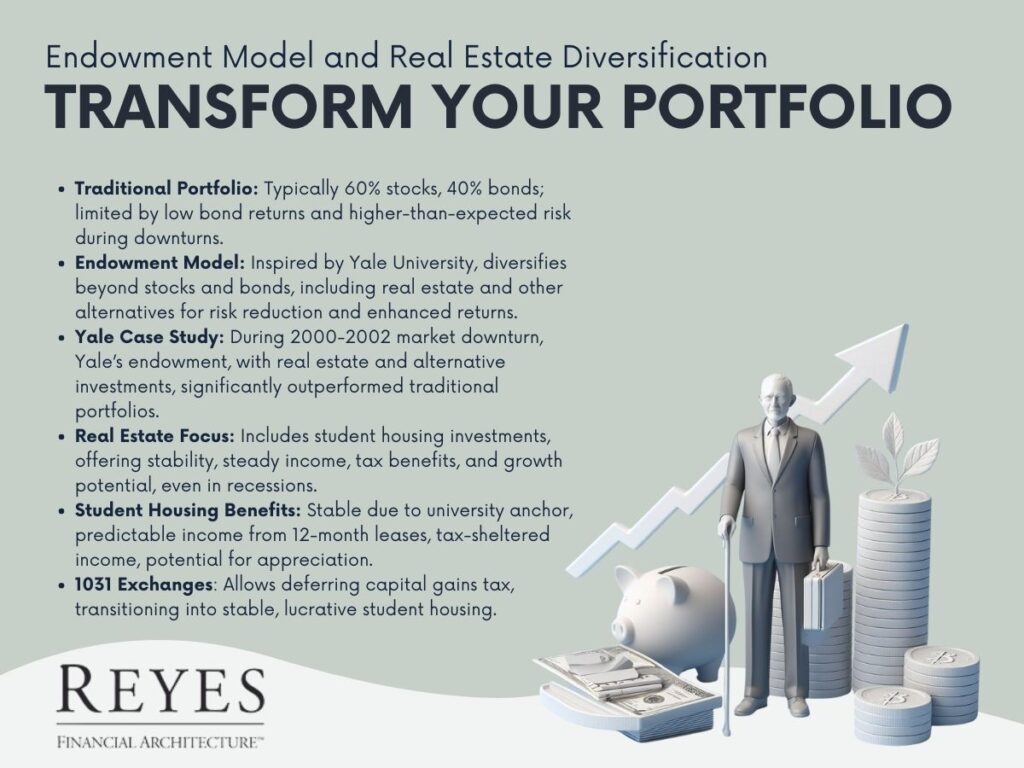
Traditionally, most investment portfolios comprise a mix of stocks and bonds. A common allocation might be 60% stocks and 40% bonds. However, this structure has its limitations. For the past decade, bonds have yielded minimal returns, dragging down overall portfolio performance.
Moreover, this traditional mix is not as low-risk as often perceived. During market downturns, such as the 2008 financial crisis, balanced portfolios of stocks and bonds still experienced significant losses. For instance, in 2008, an average stock fund lost about 30%, and a balanced portfolio saw losses around 30% at the lowest point.
The endowment model, pioneered by institutions like Yale University, offers a different approach. This model diversifies beyond stocks and bonds, including assets like real estate and other alternative investments. The rationale behind this strategy is not just risk reduction but also enhancement of returns over time.
Real estate plays a significant role in this diversified approach. It's not just about having a tangible asset but also about generating steady cash flow, gaining tax benefits, and potential appreciation.
A focus on student housing, managed by firms like NV Private Capital, further exemplifies this strategy. These properties, anchored by major universities, offer stability, income, and growth, often performing well even during recessions.
Investors holding traditional real estate can consider 1031 exchanges to transition into student housing investments. This allows them to defer capital gains taxes while moving into a potentially more stable and lucrative investment vehicle.
The financial industry often presents a conventional approach to portfolio construction, focusing heavily on stocks and bonds. However, this traditional mix may not be as secure or profitable as once thought, especially in volatile markets.
By adopting strategies used by successful endowments, like diversifying into real estate and other alternative assets, investors can potentially achieve better risk-adjusted returns. This approach, while more complex, can offer greater stability, income, and growth potential, making it an attractive option for those looking to build a more resilient and profitable investment portfolio.